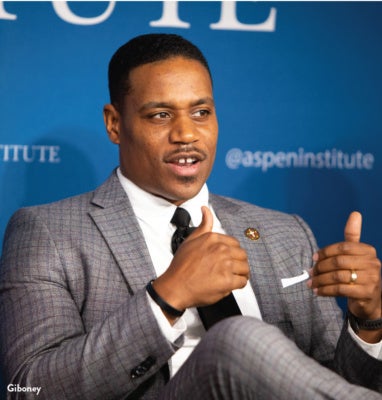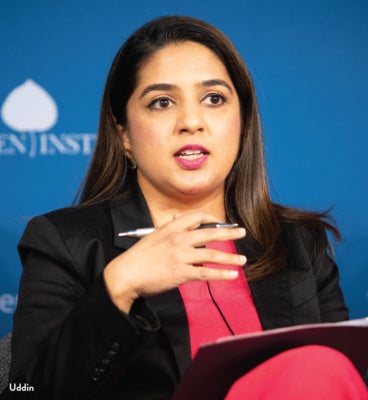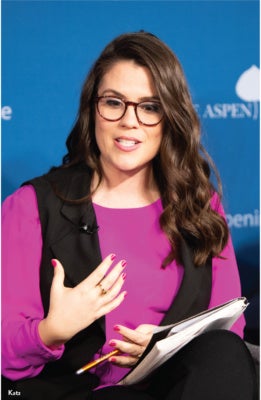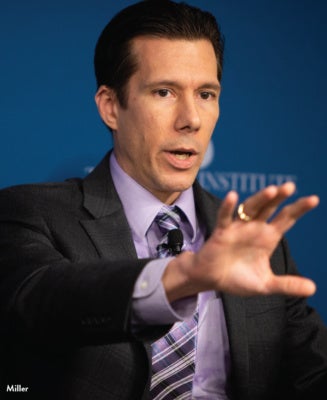It’s been a long time since we have seen an election taking place in a climate of such extreme polarization,” said Tom Gjelten, a religion and belief correspondent at NPR, during an Institute event in February, “Holy Bridges: The Role of Religion in American Polarization.” The event was a collaboration between the Institute’s Inclusive America Project and the Interfaith Youth Core. Gjelten moderated the discussion with Asma Uddin, an author and religious liberty lawyer; Sheila Katz, the CEO of the National Council of Jewish Women; Justin Giboney, the founder of the AND Campaign, a Christian group devoted to faith and democracy; and Paul D. Miller, a professor and co-chair of global politics and security at Georgetown. “We know that religion can be a force for good or evil and that many types of polarization currently divide us,” said Zeenat Rahman, the director of the Inclusive America Project. “Yet, we haven’t fully explored the intersection of those things —what it would look like if religion was an antidote to polarization.”
aspeninstitute.org/inclusive-america-project
 GIBONEY: One of the problems we have is that everybody is trying to protect their narratives. It’s not necessarily about getting to the truth, it’s about making sure that your narrative is uninterrupted and completely what you want it to be. I’m not sure either side of the aisle has a great understanding or appreciation of pluralism and what it really means. When I look on the right, I’m not sure they understand pluralism because I see xenophobia being used to get votes and gain power. I’m like, “You talk about the Constitution, but I don’t see that commitment to pluralism when it comes to how you campaign or who you vote for.” When I look on the left, I’m not sure that there’s a great understanding of pluralism there, either. Sometimes, it seems like pluralism is different flavors of progressivism. So if you’re Christian, as long as you’re allowed to be progressive, or you’re Muslim, as long as you’re moving toward being progressive, then it is pluralistic. Otherwise, they’ll say: “I’m not sure we want you on campus, we don’t want anything to do with you.” That’s wrong. Pluralism isn’t just about the issues that we can wink at and say, “Let’s agree to disagree—I’ll see you tomorrow for brunch.” Pluralism is about fundamental differences. It’s when we say, “I really dislike that you think that, but I Giboney understand that you have the right to think that.”
GIBONEY: One of the problems we have is that everybody is trying to protect their narratives. It’s not necessarily about getting to the truth, it’s about making sure that your narrative is uninterrupted and completely what you want it to be. I’m not sure either side of the aisle has a great understanding or appreciation of pluralism and what it really means. When I look on the right, I’m not sure they understand pluralism because I see xenophobia being used to get votes and gain power. I’m like, “You talk about the Constitution, but I don’t see that commitment to pluralism when it comes to how you campaign or who you vote for.” When I look on the left, I’m not sure that there’s a great understanding of pluralism there, either. Sometimes, it seems like pluralism is different flavors of progressivism. So if you’re Christian, as long as you’re allowed to be progressive, or you’re Muslim, as long as you’re moving toward being progressive, then it is pluralistic. Otherwise, they’ll say: “I’m not sure we want you on campus, we don’t want anything to do with you.” That’s wrong. Pluralism isn’t just about the issues that we can wink at and say, “Let’s agree to disagree—I’ll see you tomorrow for brunch.” Pluralism is about fundamental differences. It’s when we say, “I really dislike that you think that, but I Giboney understand that you have the right to think that.”
 UDDIN: I see this phenomenon of polarization as the switch from having a conversation in which we might disagree with another person to thinking the person is fundamentally bad. That creates a situation in which you don’t even want to engage. The crux of our polarization is the way national leaders paint certain questions such that they tend to reinforce this idea that people on different sides of the aisle are fundamentally in a battle between good and evil. When people are moralizing the discourse or turning it into a question of essential goodness versus essential badness, it becomes even more evident that religion has a particular role to play in polarization, because religion is the source of morality for so many people. That’s our moral guide. If we allow religion to be politicized, it’s just going to be another tool in that good/bad moral distinction. But if we allow religion to actually be an absolute guide, it tells us a different idea of what is good, and maybe we can overcome this moral distinction and get to a place of truth. I testified before the House Judiciary Committee for five hours, and it had nothing to do with a quest for truth. Nobody was interested in getting to the truth. It was all about people pushing their own agenda and trying to get me to say their version. That is not a quest for truth. It is a quest to prove your point and to win.
UDDIN: I see this phenomenon of polarization as the switch from having a conversation in which we might disagree with another person to thinking the person is fundamentally bad. That creates a situation in which you don’t even want to engage. The crux of our polarization is the way national leaders paint certain questions such that they tend to reinforce this idea that people on different sides of the aisle are fundamentally in a battle between good and evil. When people are moralizing the discourse or turning it into a question of essential goodness versus essential badness, it becomes even more evident that religion has a particular role to play in polarization, because religion is the source of morality for so many people. That’s our moral guide. If we allow religion to be politicized, it’s just going to be another tool in that good/bad moral distinction. But if we allow religion to actually be an absolute guide, it tells us a different idea of what is good, and maybe we can overcome this moral distinction and get to a place of truth. I testified before the House Judiciary Committee for five hours, and it had nothing to do with a quest for truth. Nobody was interested in getting to the truth. It was all about people pushing their own agenda and trying to get me to say their version. That is not a quest for truth. It is a quest to prove your point and to win.
 KATZ: I spent much of my career working on college campuses, and I saw a phenomenon: when students arrive on campus, it’s big. In order to make campus smaller, they find people who are just like them. It’s why when I worked at Hillel, we were able to find Jewish students so quickly, because they want to find each other. And the university does a really good job of allowing people to segment themselves into like-minded groups of people. But then sometimes it doesn’t do the best job of bringing people back together. You have a fair when you start school: you can find the black student movement, the Muslim student association, Hillel. There’s no fair to then meet those other people and really engage. College is one of the most diverse times in somebody’s life, when they’re really around people different from themselves. But often it’s just easier to be around people who agree with us. We have a responsibility to figure out how to shake that up a bit. We don’t want to ever put ourselves in a place where we feel threatened, but we really must do our part in teaching people the prosocial skills necessary to engage, to encourage productive discomfort, to directly address polarization.
KATZ: I spent much of my career working on college campuses, and I saw a phenomenon: when students arrive on campus, it’s big. In order to make campus smaller, they find people who are just like them. It’s why when I worked at Hillel, we were able to find Jewish students so quickly, because they want to find each other. And the university does a really good job of allowing people to segment themselves into like-minded groups of people. But then sometimes it doesn’t do the best job of bringing people back together. You have a fair when you start school: you can find the black student movement, the Muslim student association, Hillel. There’s no fair to then meet those other people and really engage. College is one of the most diverse times in somebody’s life, when they’re really around people different from themselves. But often it’s just easier to be around people who agree with us. We have a responsibility to figure out how to shake that up a bit. We don’t want to ever put ourselves in a place where we feel threatened, but we really must do our part in teaching people the prosocial skills necessary to engage, to encourage productive discomfort, to directly address polarization.
 MILLER: I did some work about what’s driving polarization. Some of it is the self-sort, the demographic changes as Americans separate themselves into enclaves based on their income, race and ethnicity, and everything else. That affects churches as well. When you have a neighborhood of rich white people, the church in that neighborhood is going to be a church of rich white people. That’s a change. It used to be the church was a place where people would mingle across age and income lines—not, sadly, race and ethnicity, which has always been segregated. The church used to be a place where the rich and the poor, the old and the young, could worship together. That’s not true anymore. It deprives Christians—a majority of Americans—the chance to experience difference, to blunt the hard edges, to get outside of their bubbles. And because that’s being perpetuated in our churches, it’s depriving us of the very tool we need to tackle the problem of polarization. It’s becoming an engine of further polarization. Another trend is the rise of mega-churches. There’s been a change in worship style that emphasizes emotion. Church has become a form of entertainment. It says, “Our religion is about making you feel good and making you experience an emotional event.” It is not a church to receive character formation or submit to the discipline of the teaching. It’s a very different vision of what religion is for. If you go to a church for an emotional experience, you’re not going to discipline yourself to form your character. That’s also going to make you much more susceptible to polarization.
MILLER: I did some work about what’s driving polarization. Some of it is the self-sort, the demographic changes as Americans separate themselves into enclaves based on their income, race and ethnicity, and everything else. That affects churches as well. When you have a neighborhood of rich white people, the church in that neighborhood is going to be a church of rich white people. That’s a change. It used to be the church was a place where people would mingle across age and income lines—not, sadly, race and ethnicity, which has always been segregated. The church used to be a place where the rich and the poor, the old and the young, could worship together. That’s not true anymore. It deprives Christians—a majority of Americans—the chance to experience difference, to blunt the hard edges, to get outside of their bubbles. And because that’s being perpetuated in our churches, it’s depriving us of the very tool we need to tackle the problem of polarization. It’s becoming an engine of further polarization. Another trend is the rise of mega-churches. There’s been a change in worship style that emphasizes emotion. Church has become a form of entertainment. It says, “Our religion is about making you feel good and making you experience an emotional event.” It is not a church to receive character formation or submit to the discipline of the teaching. It’s a very different vision of what religion is for. If you go to a church for an emotional experience, you’re not going to discipline yourself to form your character. That’s also going to make you much more susceptible to polarization.
Transcripts have been edited for length and clarity.